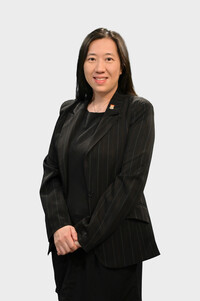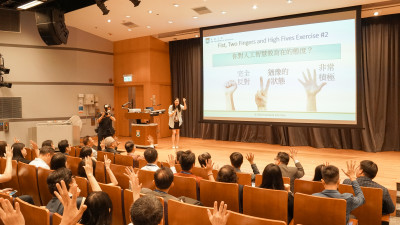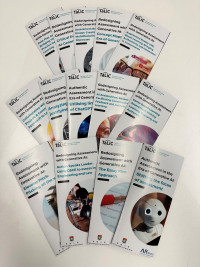AI in Higher Education
The advent of generative artificial intelligence (GenAI) over the past year has sent universities and just about everybody else searching for experts who can advise them on best practices and guidelines. One of the top go-to people in higher education in the world has been Professor Chan Ka Yuk, Cecilia, who brings a unique set of skills and strong networks to the task.
Professor Cecilia Chan of the Academic Unit of Social Contexts and Policies of Education, has a PhD in engineering, as well as qualifications in education, and is also the new Director of HKU’s Teaching and Learning Innovation Centre (TALIC), which was formed in July 2023 to bring together various teaching support units, including those focused on teaching technologies, under one roof. She previously led a team to help HKU teachers meet the challenges of online learning during COVID-19. That was a big task, but then on November 30, 2022, came an even bigger challenge, the launch of the language model ChatGPT, which has suddenly made everyone question how GenAI will change learning and their working lives.
“I started researching GenAI even before ChatGPT was launched because I was aware something was coming. And ever since, I have been collecting data about what our students and teachers want, which has also supported our HKU policy,” she said.
Appreciating the urgent implications of AI, she has worked at breakneck speed to produce more than five published papers and a forthcoming book on the matter, alongside her duties at TALIC, where she helped to develop a GenAI policy for the whole University, launched WhatsApp support and an AI clinic for teachers, created a dedicated website called AI in Education, and created a five-week self-paced online module on AI literacy for both staff and students. All in less than six months.
Global Impact
Her work has attracted widespread interest not just at HKU but universities around the world, from places as far apart as the Philippines and Ecuador. Local schools have also been in touch (she was invited to speak at a conference on AI in schools for Hong Kong and Macau principals) and more than 100 people have enquired about joining her as a postgraduate student to research AI.
“It’s been absolutely crazy and really interesting. I am working extremely fast because I know that the earlier you adopt, the faster that people know your work. This helps the University and the Faculty, too, because people can see we are doing top-notch work on AI in education here. In fact, HKU was one of the first universities to have a proper AI policy in place. It is a broad policy, but it is something to work with,” she said.
Her own work has offered valuable insights about how university teachers and students perceive AI. One paper found both groups were equally concerned about the need for a policy to guide AI use in the classroom, and a survey of more than 400 students found that they preferred talking to a human teacher and receiving empathetic feedback from them rather than dealing with AI teachers. “I’m not saying in the future AI will not be able to offer that, but at this moment, students still want us,” she said.
The work has underscored her belief in the importance of “21st century” skills relating to holistic development – things like creativity, leadership, professional ethics and resilience – which has been her main research interest in recent years. Her book, Assessment for Experiential Learning, published in summer 2022, explored these skills in a context where they are often the desired outcome and she has also spearheaded the formation of the International Holistic Competency Foundation with more than 20 other leading institutions, such as the University of Oxford, Tsinghua University and the National University of Singapore, which accredits courses that develop or promote holistic skills.
“The more I look at AI, the more I can see how important 21st century skills are. People are saying, if AI is here, what will be my role? Well, you still need the human touch and things like information literacy. ChatGPT cannot represent us just because it can write a lot of lovely words,” she said. “We are trying to change the culture internationally so that people care about these soft skills, too.”
Future Prospects
To explore the effects of AI further, she has written a forthcoming book The ChatGPT Effect: Generative AI in Higher Education which will be published by Routledge. It is co-authored with a technology specialist and looks at issues such as assessment and AI literacy, embracing ChatGPT in curriculum design, and developing a policy framework. “This is not just for our university. I have a template showing step by step how institutions can develop an AI policy. I think everyone in the world is looking for something like this.”
Professor Chan has also written a 60-page booklet with assessment guidelines for university teachers on using AI and issues to consider. One that looms large in both publications is misconduct or plagiarism. She believes there may need to be differing boundaries or definitions, depending on the discipline. For instance, the intended learning outcome for engineering students is not their writing abilities, so does it matter if they use ChatGPT to help write their reports? For literature majors, on the other hand, its use would be different. “Each university and each faculty will need to think about what academic misconduct means with AI,” she said.
Disciplines also need to consider how AI may affect the future prospects of their graduates and what they should be teaching students. Professor Chan has secured funding to look at different industries and how they are or should be using AI. This includes the field of education, where new AI apps can generate learning outcomes and lesson plans. “Is this something we should be teaching our students how to use, because maybe it is the future? These are things we need to know.”
“This has all been a great opportunity and experience for me: one, because it is interesting for my own research and intertwines between engineering and education; two, because it is great for the university and Faculty to be leading the way in AI in education; and finally, because it allows me to contribute to the world that future generations will experience, including my own children. The world is changing rapidly, so I am glad that I have this opportunity to play a part,” she said.

Professor Cecilia Chan has devoted her efforts to researching and understanding the implications and potential benefits of AI in education.

Professor Cecilia Chan presents at the "2023 Smart Education Forum" at The University of Hong Kong and discusses how AI can help improve teaching quality and students' learning experience for schools in Macau and Hong Kong.

Information leaflets of “Redesigning Assessment with Generative AI” designed by Professor Cecilia Chan and her team provide teachers with innovative assessment ideas and support in the era of AI advancements.


